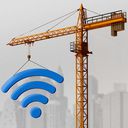Biden Cabinet appointees raise new hopes for smart city projects

It's time to polish our gleaming vision of urban environments where internet technology makes everything from finding a parking space to measuring air quality a snap.
Why it matters: The Biden administration's Cabinet appointees are likely to be champions of bold futurism in urban planning — which could mean that smart infrastructure projects, like broadband deployment and digital city services, get fresh funding and momentum.
Driving the news: Leaders who have pioneered smart technology in their own cities — like Rahm Emanuel of Chicago, Eric Garcetti of Los Angeles and Keisha Lance Bottoms of Atlanta — are top contenders to run the Department of Transportation, as Axios' Hans Nichols reports.
- Other Biden appointees are also likely to pick up where the Obama administration's landmark support for smart cities left off.
- Their attitude would set the tone at the top, creating a ripe environment for Internet of Things projects like smart traffic grids and streetlight systems.
- Democrats could jump-start smart city initiatives by passing some version of the $1.5 trillion infrastructure bill that the House of Representatives approved in June.
- There's pent-up demand among cities to get going with a laundry list of "smart" projects, from 5G expansion to fire-detecting drones and power grids that can self-adjust to shifting energy use at different times of day.
What they're saying: "I would expect infrastructure to be at the top of the Biden administration wish list," Chattanooga Mayor Andy Berke tells Axios.
- "When he says 'build back better,' what city leaders hear is that he is going to help us implement many of the projects that we've been waiting to build for years."
The details: Across the U.S., "smart city" initiatives are just starting to gain approval or bear fruit.
- In San Jose, emergency response vehicles equipped with a smart GPS system no longer have to slow down at traffic interchanges — lights turn green in advance for them.
- In Austin, voters just approved a property tax hike to pay for a massive new "smart city" transit system.
- The World Economic Forum just selected Chattanooga and San Jose as two of 36 "pioneer cities" that will test policies "in areas ranging from privacy protection and cyber security to better services for disabled people and better broadband coverage."
But, but, but: There's been a lot of hype in the "smart city" universe —with tech vendors overpromising and underdelivering — and some projects have faced pushback.
- A camera-laden streetlight installation in San Diego sparked controversy after cops started using it for crime-solving.
- In Toronto, Alphabet's urban innovation arm — Sidewalk Labs — scrapped its plans for a development called Quayside.
- The project faced doubts about whether it could make enough profits for Google without jeopardizing the city's social goals, including affordable housing, a more inclusive economy and improved mobility, per the Toronto Star.
Where it stands: Spending on smart urban initiatives could fall in the near term as cities grapple with coronavirus-related budget woes. But it's expected to take off in the next five years.
- Frost & Sullivan projects that the number of "smart cities" will snowball from zero to 26 globally by 2025, when spending on related technology will reach $327 billion.
- "COVID-19 has created a window of opportunity and a sense of urgency," Debra Lam, of Georgia Tech's Smart Cities and Inclusive Innovation project, tells Axios.
- "People are saying, wow, connectivity is an important public service, just like running water — you expect it to be provided to you by the government."